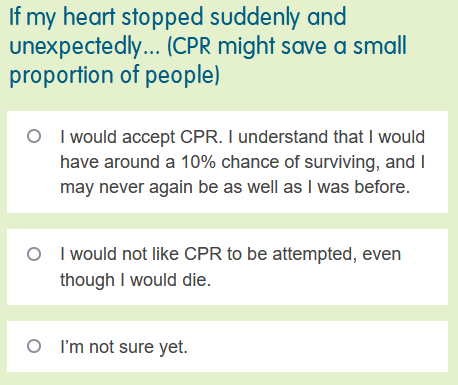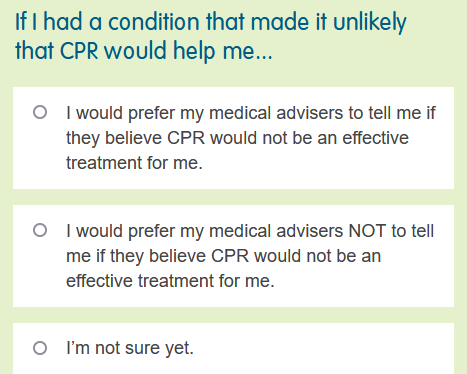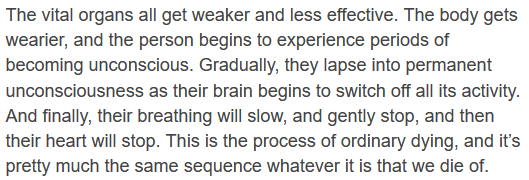Support Planning Ahead: A tool to help DNACPR decision making
This blog explores a great resource from Hospice UK to support Advance Care Planning specifically at the section for discussions about cardiopulmonary resuscitation.
Cardiopulmonary resuscitation is a medical treatment that can be given when you stop breathing (respiratory arrest) or your heart stops beating (cardiac arrest). The purpose of CPR is to re-establish breathing and heartbeat.
A decision not to start CPR treatment can be an important part of planning ahead and is called Do Not Attempt Cardiopulmonary Resuscitation (DNACPR)[i]; you can find out more on the NHS website. I have blogged earlier in LPAs, Cars & DNACPR exploring what DNACPR, the role of Lasting Power of Attorney (LPA) with DNACPR and summarise some key points below:
Key points
CPR is a valuable medical treatment for a very specific situation, not a cure for Ordinary Dying. Raising awareness both publicly and professionally about the role DNACPR has to play in Advance Care Planning is needed and I suggest in an earlier blog that Advance Care Planning is just one part of part of Normal Life Planning
To summarise:
1. You have the right to be consulted about but not to demand CPR
2. CPR is not an appropriate treatment for Ordinary Dying
3. An attorney can refuse but not demand CPR for you
DNACPR is an emotive subject I am happy to answer questions in more detail, provide education or support in making an LPA.
A Planning Ahead Tool developed by Hospice UK earlier this year includes some great resource for having a DNACPR discussion. It’s strength lies in the clarity of explanation about CPR in three different situations and the option to think of these separately. The three situations are:
· CPR for when a heart stops unexpectedly. CPR might save a small proportion of people
· When CPR is unlikely to succeed. Some conditions can make it very unlikely that CPR will help.
· When CPR is undesirable. For someone who is already clearly dying, CPR will not help.
The section starts with an explanation about what CPR is and explains that having a DNACPR doesn’t change any other treatment options:
Following information about why people may choose not to have CPR, there is an option for considering your CPR preferences if your heart was to suddenly stop.
The next section is for thinking about when CPR is unlikely to succeed. The section explains that someone with long term organ damage may not survive a cardiac arrest.
The third section describes when CPR will not help for someone who is already clearly dying. There is a description of what happens in Ordinary Dying and why CPR cannot be re started.
All to often it is this nuance of discussion that is lost, and a CPR discussion becomes a clunky question. It’s really helpful to see the three different scenarios set out clearly because understanding CPR in the context of overall health is so important. The Hospice UK Planning Ahead Tool is one way of approaching this important part of Advance Care Planning.
If you would like to discuss Advance Care Planning, making your Lasting Power of Attorney or have any questions contact me .
[i] The ReSPECT process is in widespread use in England, this includes a section on CPR https://www.resus.org.uk/respect




